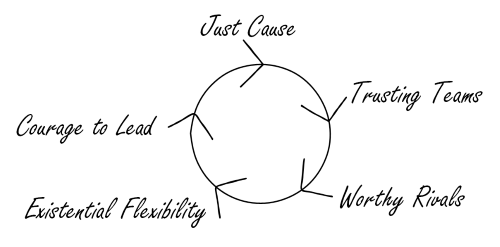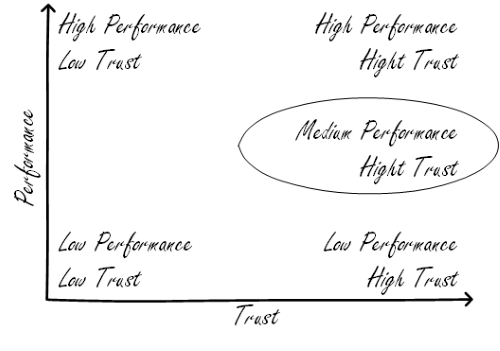The Infinite Game
Finite and Infinite Games
The following constitute a finite game:
- Known players
- Clear goal
- Limited in time
- Clear way of establishing a winner
The following constitute an infinite game:
- Known and unknown players
- Unlimited in time, runs forever
- There are no winners and no losers, only relative measurements (ahead and behind)
- No clear goal other than to keep paying the game for as long as possible
An infinite game is similar to how the meta game is played as described by Jordan B. Peterson in Beyond Order: 12 More Rules for Life.
When we play with a finite mindset in the Infinite Game, we will continue to make decisions that sabotage our own ambitions. It’s like eating too many desserts in the name of “enjoying life” only to make oneself diabetic in the process.
- Simon Sinek
The book describes 5 Infinite mindset practices:
- Advance a Just Cause
- Build Trusting Teams
- Study your Worthy Rivals
- Prepare for Existential Flexibility
- Demonstrate the Courage to Lead

A Just Cause is different than our Why, but it must be in accordance with it. The Why is personal, while the Just Cause is universal. Anyone can formulate it, and anyone can join it.
A just cause must be:
- For something - affirmative and optimistic
- Inclusive - open to all those who would like to contribute
- Service oriented - for the primary benefit of others
- Resilient - able to endure political, technological and cultural change.
- Idealistic - big, bold and ultimately unachievable
When a Just Cause is found, it must be written down in order to be accurate (“#10: Be precise in your speech” - Jordan B. Peterson, 12 Rules for Life: An Antidote to Chaos) and to be able to expose it to others as well as passing it down.
A Just Cause seems to be a source of meaning focused on helping or supporting others in a way that goes beyond time. A noble ambition for the betterment of all that is construction oriented, available to all so anyone can join and unending. Life ending poverty, as we progress the bar that defines poverty will change and sustained effort is required in order to help everyone keep above it. Anyone can join this cause.
Even well-intended finite-minded leaders often have the perspective of “make money to do good”. An infinite perspective on service, however, looks somewhat different: “Do good making money” (the order of the information matters). I will do good in how I treat people and serve my community throughout my life and still build a financially strong organization.
- Simon Sinek
The navy SEALs use a two-dimensional graph to determine who can join their team. One of them is performance while the other is trust, the individual’s level of trust among team members.

The way one SEAL team member put it, “I may trust you with my life but do I trust you with my money or my wife?”
- Simon Sinek
The navy SEALs value trust over performance. They may not get the best individuals, but they get the best teams because of it. A medium performer, sometimes even a low performer of high trust may be picked above a high performer of low trust.
People should not be discarded immediately. People should be first tested to see if they are coachable. A high performer of low trust may be taught to be more open and more accountable when they make mistakes. It is possible they were previously thought to dismiss or crush others at previous companies or had bad experiences in the past. A person should not be condemned immediately, a fair chance or two should be given, ad if nothing changes then there is concrete information on which decisions can be made rather than speculation. The same can be applied to low performers. Skill can be taught, if the other person is willing, great leaps can be made and great things can be achieved. Coachability is another metric to be considered.
Leaders are not responsible for the results, leaders are responsible for the people who are responsible for the results.
- Simon Sinek
Ethical Fading is something that happens over time, hence the word fading, it’s in everyday small steps. An incremental process.
One of the ways we engage in ethical fading is through self-deception. By calling things as not exactly as they are, softening the language. This can be a problem for agreeable people or people who are conflict avoidant (“#8: Tell the truth — or, at least, don’t lie”, and “#10: Be precise in your speech” - Jordan B. Peterson, 12 Rules for Life: An Antidote to Chaos).
Another way ethical fading may happen is through denial of responsibility. Taking, or not taking, responsibility for our actions is tied to meaning as well.
Remember, the very definition of ethical fading is engaging in unethical behaviour while believing that we are still acting in line with our own moral or ethical code.
- Simon Sinek
Worthy Rivals are a way to inspire us to be more, compared to competitors that we aim to beat so that we win. Playing in an Infinite Game, such as life, requires us to welcome new players, better players, so that we improve our own game. It requires us to further understand our own goal, our own motivation, our reason to be.
Worthy Rivals do not compare themselves traditionally (?) by some metric. They have different visions. By definition, they are not comparable, the way we operate in Infinite Games is multi-dimensional. There is no “one metric”, there are multiple dimensions which are not comparable with one another, nor do the priority (or tracking even) is the same. People value different things making them incomparable. What we are left with is choice, but not in terms of “better”, but in terms of alignment. This better aligns with what I believe in.
Worthy Rivals can help highlight what we believe in through contrast. That is what they believe in, this is what I believe in; that is what they stand for, this is what I stand for. It should not be stated but it does seem necessary. Just because you have a different opinion it does not mean that the other person is wrong. You can always learn something from someone else, or at least that should be the assumption (“#9: Assume that the person you are listening to might know something you don’t” - Jordan B. Peterson, 12 Rules for Life: An Antidote to Chaos).
When a new disruptive, or revolutionary technology is underway, most often than not, companies fail to adapt trying to keep the current technology in place and continue to reap the benefits. It only works for a time. You cannot stop progress; you can delay progress.
This applies to what we do daily. Once we find or observe a better way of doing things, we should embrace change and improve. This is, in a nutshell, Existential Flexibility.
The Courage to Lead is described by deciding to go on a path that promotes the Just Cause even if it incurs costs (like less profit). It is a statement of devotion towards the Cause. Basically, the Courage to Lead is putting your money where your mouth is (“#7: Pursue what is meaningful (not what is expedient)” - Jordan B. Peterson, 12 Rules for Life: An Antidote to Chaos).